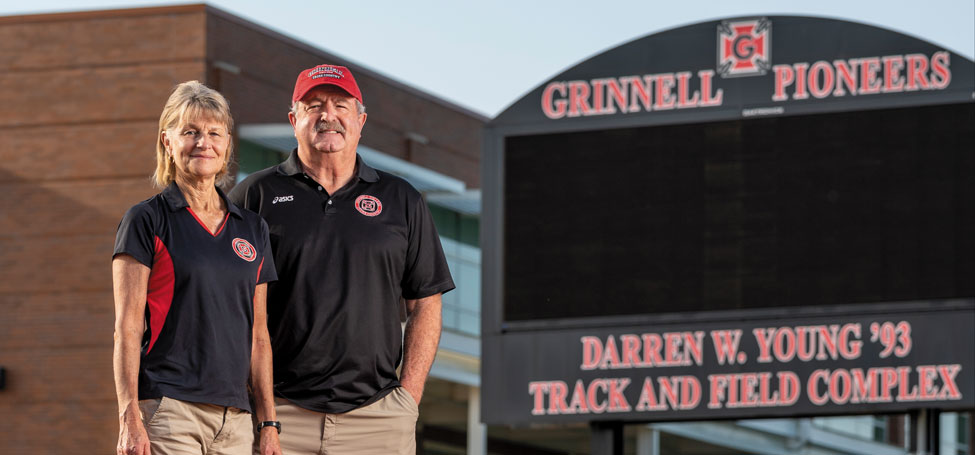
Finish Line Just Ahead
Will and Evelyn Freeman came to Grinnell in 1980 to interview for the head coach positions for track and field and cross country. They had never been to Iowa, never heard of Grinnell College, and had no idea what to expect. They met with President George Drake ’56, athletic director John Pfitsch, and student-athletes from the cross country and track and field teams.
Evelyn thought they had bombed the interview with students. “Every time they asked us a question and we answered, there was no response back from them. There was no smile. There was no nodding, there was no frowning, there was nothing. So, we didn’t know how we did.”
The Freemans landed the job.
Now, almost 40 years later, as they transition to senior faculty status at the end of the 2019–20 school year, they are looking back on how they created a home in Grinnell and built a program that has had a profound impact on generations of Grinnellians. If Evelyn was unsure how the students felt back in 1980, she can now rest assured. The Freemans have become an institution in Grinnell, mentoring scores of young student-athletes on their journeys through college and beyond.
Individually Advised, Individually Coached
In September, a host of alumni returned to campus for the Cross Country and Track and Field Alumni Reunion Weekend, joining current student-athletes to recognize the Freemans’ contributions. Many more expressed their gratitude in the form of letters, dozens and dozens of them, presented to the Freemans at the reception.
A common refrain among those at the reception was an appreciation for the Freemans’ athlete-centered approach to coaching. The Freemans treat their student-athletes as more than just runners, jumpers, or throwers, electing for a holistic approach to coaching the whole person.
For the Freemans, success is not measured in terms of championships (of which there are plenty), but rather in the personal growth experienced by members of the teams.
For Emma Luhmann ’18, the Freemans’ athlete-centered model is more than just an abstract coaching philosophy. “I always felt like an individual with them. They have these big teams, and so many athletes go through the program. But I think they know each person very well as an individual. That says a lot about them.”
Terran Mott ’20 echoed the sentiment. “Will and Ev’s priority has always been to help people grow as people first and athletes second, and they literally see us as their children. They designed their house to accommodate teams of people.”
For Mott, who sees herself as “a pretty mediocre runner,” the Freemans’ commitment to holistic coaching has enabled her to grow beyond athletics. “They’re very successful at helping people grow. And that’s why they have had such a big impact here.”
Team: Another way to spell community
For most Grinnell student-athletes, formal athletic competition fades after graduation, but the lessons learned from their experiences continue long past their time at Grinnell. And so too, do their memories. Track and field and cross country might not be as visibly team-oriented as other sports, but the Freemans have managed to sustain an intense spirit of camaraderie and belonging among their student-athletes.
Perhaps one of the most impressive markers of the Freemans’ legacy is how they managed to create a community among their student-athletes, both current and former. Being on a team coached by the Freemans conjures up remarkably similar feelings among graduates from the 1980s up to current student-athletes.
In the Freemans’ vision of a successful team, there’s a place for everyone. Sophie Neems ’16 found her place on the team as the “self-dubbed captain of enthusiasm.” In high school, Neems noticed a divide between the fast runners and the slower ones. At Grinnell, she found a different dynamic.
“We were all part of the same team. Our practices were the same and the coaches treated us the same, whether you were winning the race or not. I think that really made a big impact on team culture.” Even though there are talented individuals, Neems says, “the community of the team is what matters the most.”
It can be a challenge to create and sustain traditions in a college environment with new students every year, but through annual sleepovers at the Freeman house, tattoos — temporary or permanent — and Evelyn’s “affirmation week,” the Freemans and their student-athletes have built a shared experience that extends through generations.
Traditions like those create bonding experiences, but perhaps the real binding agent is the Freemans themselves. Josh Jensen ’19 says of the Freemans, “Will and Ev are the type of people that you never forget. I think their personalities and the way they impact your life and the way you approach everything like beyond running is just kind of astounding. That always sticks in the back of your mind.”
The Freemans’ spirit will surely live on, in their student-athletes and through the next generation. Sophie Neems put it best, “Once you run for Grinnell, you always run for Grinnell. Once you’re a beast, you’re always a beast.”
To hear from Will and Evelyn about their reflections on four decades of coaching at Grinnell, listen to episode 7 of season 2 of All Things Grinnell, available wherever you listen to podcasts.
